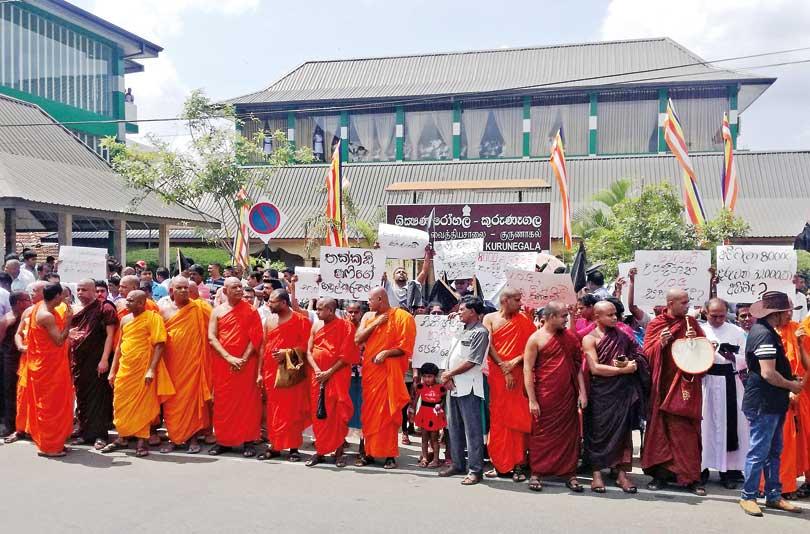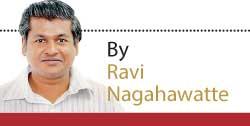10 Oct 2019 - {{hitsCtrl.values.hits}}

 There was once a time in Sri Lanka when even despite the dictatorial rule of the Rajapakasas there was a glimmer of hope for the people because a law operated in the country. Continuing from that dark era, when democracy was virtually nonexistent, people saw the law receiving its deserving status as one of the three pillars on which democracy exists.
There was once a time in Sri Lanka when even despite the dictatorial rule of the Rajapakasas there was a glimmer of hope for the people because a law operated in the country. Continuing from that dark era, when democracy was virtually nonexistent, people saw the law receiving its deserving status as one of the three pillars on which democracy exists.
At present under the Wickremesinghe government any person having a grievance has the right to seek the assistance of the law. This is what Prof. Chandragupta Thenuwara and Gamini Viyangoda did when they raised abjections about the citizenship status of president hopeful Gotabaya Rajapaksa. The issue here is that they had received death threats at the time they were filling their cases. They had later made complaints to the CID regarding this negative development. The threats had been made to them via social media. For the record their case was thrown away by the court, but
Now, what’s disturbing is that these developments suggest that laymen are trying to take the law into their hands. Just the other day some Buddhist priests disregarded a court order-which prohibited activities inside a disputed plot of land where there is a kovil (A place of Hindu worship)- and conducted the funeral of a deceased monk. Several days later lawyers from Mulaitivu, the place where the disputed land exists, staged a protest against the law being disregarded.
Now this is a trend that should be nipped in the bud. We saw how former Chief Justice Shirani Bandaranayake was impeached in a controversial manner under the Rajapaksa regime. She was later reinstated in her position after a regime change. We also saw a 52-day government that was operating being thrown out after fundamental rights petitions were filed and 122 MPs went to courts seeking a quo warranto writ. When Rajapaksa was sworn in as the premier in place of Wickremesinghe, people lit crackers and cheered the move. This was because the thinking of those who celebrated had more to do with their hearts driving them rather than being guided by the law. The same happened during the Gurukanda incident.
Sri Lankans either jump into conclusions far too early or dispute a court order when the verdict goes against pubic perception. An incident that took place recently in Galewala underscores the former
This is a nation where the die-hard Sinhalese wish to believe that their thoughts of enjoying benefits in the country must not be hindered by the law.
When a vociferous monk recently threw his weight about in Gurukanda, he was heard telling that how the funeral rights were performed had more to do with the “Buddha’s Law’. The government to date hasn’t questioned this priest about how he influenced proceedings at the funeral let alone conduct an inquiry into how a court order was disregarded.
There are times when lawyers are split over a final court ruling. There were those who wanted the law to take its course, wishing to see whether their was anything unjust about the citizenship documents of Gotabaya. The court threw away the case filed to question Gotabaya’s Sri Lankan citizenship status. But what was unbecoming was a section within the courtroom cheering the verdict which went in favour of Gotabaya. Now the Court of Appeal has warned that if there were those practising the law among those who cheered inside the court room that they would have to face legal consequences. If there are lawyers among those who cheered, hypothetically that would be similar to an ICC match referee cheering a winning side after a game of cricket.
This is a nation where the die-hard Sinhalese wish to believe that their thoughts of enjoying benefits in the country must not be hindered by the law
Sri Lankans either jump into conclusions far too early or dispute a court order when the verdict goes against pubic perception. An incident that took place recently in Galewala underscores the former. There has been an incident where a village has shunned six children in a family because one member was believed to have contacted AIDS.
According to reports what had happened was that one adult member of this family who had gone abroad in search of employment had returned with a skin rash. The villagers had assumed that this family member had contacted AIDS hence the negative trickledown effect affecting the lives of other members of the family.
Another issue was the case where a doctor from Kurunegala was allegedly taken into custody because patients who were operated on by this doctor complained of him having performed illegal sterilisation procedures. Eventually none of these allegations was proven on medical grounds. However vociferous protesters put severe pressure on the government in an attempt to show a nation that public perception of a vigilant society-whether right or wrong- could bring solace to the grieving minds when a court verdict is delaying.
This laymen thinking when it comes to matters regarding judicial matters is the bane of this society.
Now, what’s disturbing is that these developments suggest that laymen are trying to take the law into their hands. Just the other day some Buddhist priests disregarded a court order-which prohibited activities inside a disputed plot of land where there is a kovil (A place of Hindu worship)- and conducted the funeral of a deceased monk
The subject of law is a tricky one where a witty lawyer can turn the tables on a lawyer representing a plaintiff; largely because of studying the case better and using the skills to debate. But during the recent past, in cases involving the Gurukanda incident and this controversial doctor employed in Kurunegala, saffroned robed monks made their loud voices bury the professional opinions of those who practise the law. In this multireligious country it is wise if we build a society where its members practise their religions at home and honour the law when they step into society.
28 Dec 2024 8 hours ago
28 Dec 2024 9 hours ago
28 Dec 2024 28 Dec 2024
28 Dec 2024 28 Dec 2024
28 Dec 2024 28 Dec 2024